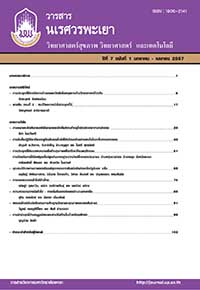การประยุกต์ใช้แบบแผนความเชื่อด้านสุขภาพเพื่อปรับเปลี่ยนพฤติกรรมการป้องกันการได้รับฟลูออไรด์สูงเกินมาตรฐานจากน้ำบริโภคของประชาชน ตำบลทุ่งรวงทอง อำเภอจุน จังหวัดพะเยา
Keywords:
แบบแผนความเชื่อด้านสุขภาพ, ฟลูออไรด์สูงเกินมาตรฐาน, Health belief model, fluorife excessAbstract
การศึกษานี้เป็นการวิจัยกึ่งทดลอง มีวัตถุประสงค์เพื่อศึกษาผลการประยุกต์ใช้แบบแผนความเชื่อด้านสุขภาพเพื่อปรับเปลี่ยนพฤติกรรมการป้องกันการได้รับฟลูออไรด์สูงเกินมาตรฐานจากน้ำ บริโภคของประชาชน ตำบลทุ่งรวงทอง อำเภอจุน จังหวัดพะเยา กลุ่มตัวอย่าง 60 คน แบ่งเป็นกลุ่มทดลอง 30 คน กลุ่มเปรียบเทียบ 30 คน กลุ่มทดลองได้รับโปรแกรมสุขศึกษาโดยการบรรยายประกอบ power point การยกตัวอย่างตัวแบบ การทดสอบปริมาณฟลูออไรด์ในแหล่งน้ำบริโภค และการให้คำปรึกษา ส่วนกลุ่มเปรียบเทียบ ได้รับความรู้แบบปกติ เก็บรวบรวมข้อมูลโดยใช้แบบสอบถาม การวิเคราะห์ข้อมูล ข้อมูลทั่วไปวิเคราะห์ด้วยสถิติเชิงพรรณนา ได้แก่ ร้อยละ ค่าเฉลี่ย ส่วนเบี่ยงเบนมาตรฐาน การเปรียบเทียบความแตกต่างของค่าคะแนนเฉลี่ย ภายในกลุ่มด้วยสถิติ one-way ANOVA, paired sample t-test และเปรียบเทียบความแตกต่างของคะแนนเฉลี่ยระหว่างกลุ่มด้วยสถิติ independent sample t-test กำหนดนัยสำคัญทางสถิติที่ระดับ 0.05
ผลการวิจัยพบว่า ภายหลังการทดลองกลุ่มทดลองมีคะแนนเฉลี่ยความรู้เรื่องฟลูออไรด์ การรับรู้โอกาสเสี่ยง การรับรู้ความรุนแรง การรับรู้ผลดีของการป้องกัน การรับรู้อุปสรรคของการป้องกัน และพฤติกรรมการป้องกันการได้รับฟลูออไรด์เกินเพิ่มขึ้นมากกว่าก่อนทดลอง และมากกว่ากลุ่มเปรียบเทียบอย่างมีนัยสำคัญทางสถิติ (p-value < 0.05) โปรแกรมสุขศึกษานี้ จึงมีความเหมาะสมที่จะนำไปปรับเปลี่ยนพฤติกรรมการป้องกันการได้รับฟลูออไรด์สูงเกินในน้ำบริโภคในพื้นที่เสี่ยงอื่นๆ ได้
The application of health education base on health belief model for behavior changing to prevent the fluoride excess in drinking water in Chun district, Phayao province
Kriengsak Seemork1 and Sanhawat Chaiwong 2*
1School of Medicine, University of Phayao, Phayao Province 56000
2 Division of Public Health, School of Medicine University of Phayao, Phayao Province 56000
This research was quasi-experimental research and aimed to study the effects of the application of health education base on health belief model for behavior changing to prevent the fluoride excess in drinking water in Chun district, Phayao province. The sample of 60 people were divided to experimental group and comparison group, with each group of 30. The experimental group was received health education program which comprised of different activities such as lectures, power point presentation of knowledge about fluoride, model of dental fluorosis, fluoride testing in drinking water, and researcher’s suggestion. The comparison group was received normally information. Data were collected by questionnaire. The demographic data were analyzed by descriptive statistics such as percentage, mean, standard deviation, and estimate statistics were analyzed by one-way ANOVA, paired sample t-test and independent t-test at 0.05 level of significant.
After experiment, the experimental group has mean scores of knowledge, perceived susceptibility, perceived severity, perceived benefits and behavior to prevent the fluoride excess in drinking water higher than before and the comparison group by statistically significant (p-value < 0.05). Except perceived barriers to prevent the fluoride excess in drinking water higher than before by statistically significant (p-value < 0.05), but not difference from comparison group. This study reflected that the health education program which applicated from health belief model appropriated for behavior changing to prevent the fluoride excess in drinking water, and could be apply to other risk areas.
Downloads
Published
How to Cite
Issue
Section
License
ผู้นิพนธ์ต้องรับผิดชอบข้อความในบทนิพนธ์ของตน มหาวิทยาลัยพะเยาไม่จำเป็นต้องเห็นด้วยกับบทความที่ตีพิมพ์เสมอไป ผู้สนใจสามารถคัดลอก และนำไปใช้ได้ แต่จะต้องขออนุมัติเจ้าของ และได้รับการอนุมัติเป็นลายลักษณ์อักษรก่อน พร้อมกับมีการอ้างอิงและกล่าวคำขอบคุณให้ถูกต้องด้วย
The authors are themselves responsible for their contents. Signed articles may not always reflect the opinion of University of Phayao. The articles can be reproduced and reprinted, provided that permission is given by the authors and acknowledgement must be given.








